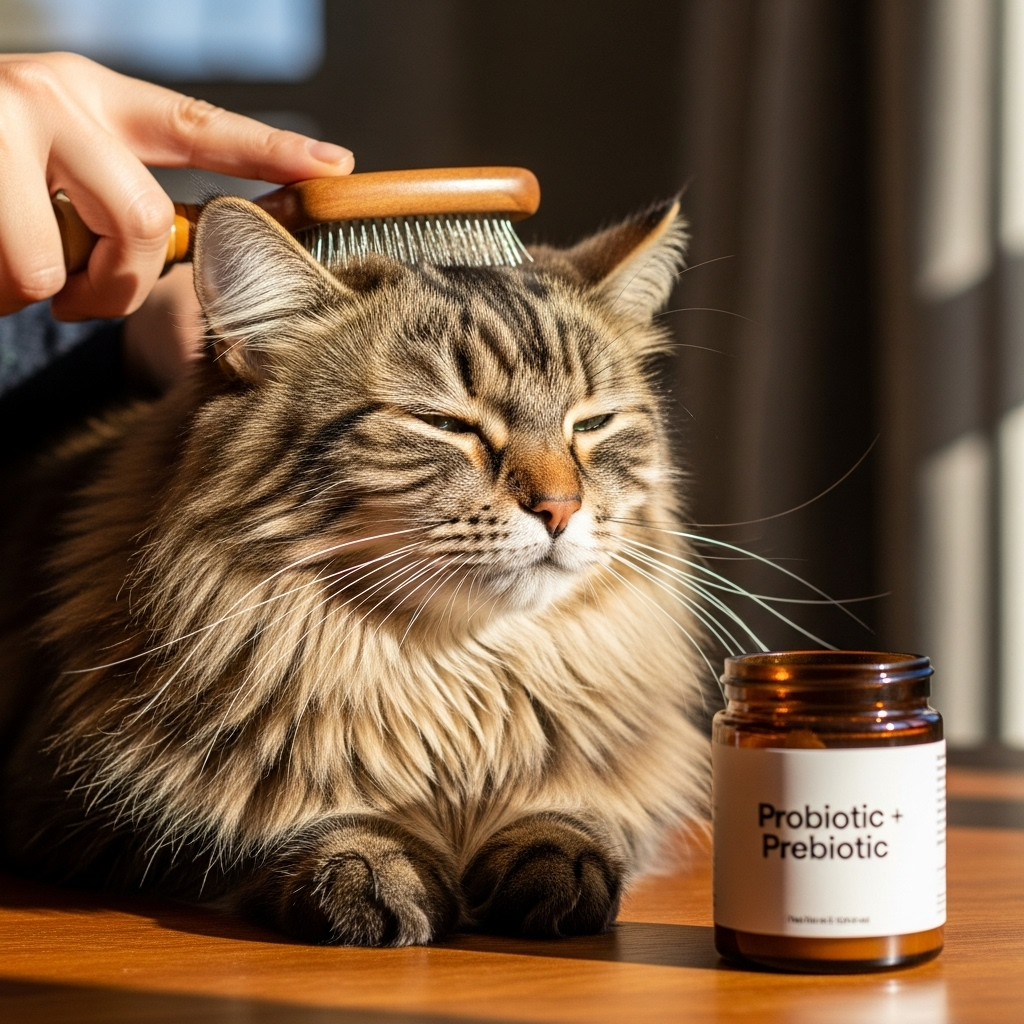Can Probiotics Support Cat Skin & Coat Wellness?

Healthy skin and a glossy coat are signs that your cat is thriving. Pet owners increasingly ask whether probiotics—beneficial microorganisms that support digestive health—can also help with skin and haircoat condition. This article explains what probiotics are, how they might influence skin and coat health in cats, what the evidence says, and practical, safe steps you can take if you’re considering adding a probiotic to your cat’s routine.
What are probiotics and how could they affect skin & coat?
Probiotics are live microorganisms—usually bacteria or yeast—that, when administered in adequate amounts, can offer health benefits. In pets, probiotics are most often given to support digestion and balance the intestinal microbiome. The idea that they might influence skin and coat health rests on the concept of the gut-skin axis: interactions between the gut microbiome, the immune system, and skin function.
The gut-skin connection
The gut microbiome helps educate and modulate the immune system. A balanced gut community can reduce systemic inflammation and influence allergic responses. Because many skin conditions (such as dermatitis, scaling, and increased shedding) involve immune or inflammatory pathways, improving gut health could plausibly have downstream benefits for skin and haircoat.
Types of probiotic products for cats
- Oral probiotics formulated specifically for cats (powders, capsules, chews, or food toppers).
- Synbiotics: products combining probiotics with prebiotics (fiber that feeds good bacteria).
- Topical or shampoo products that contain probiotic strains, lysates, or postbiotics designed to support the skin surface microbiome.
What does the research say?
Research directly linking probiotics to improved skin and coat health in cats is limited. Most data come from studies in humans, laboratory models, or other species (for example, dogs). Some key points to keep in mind:
- Controlled studies in humans show certain probiotics can help with atopic dermatitis and allergic skin conditions, likely through immune modulation.
- In dogs, some probiotic strains have shown promise for reducing skin inflammation and improving coat condition in small studies or clinical reports.
- In cats, evidence is emerging but not yet robust. Some veterinarians report improvements in dermatitis or excessive shedding when an underlying gut imbalance is addressed, but large clinical trials are lacking.
Because species differences exist and individual responses vary, probiotics should be considered a supportive approach rather than a guaranteed treatment for skin or coat problems.
Practical guidance for pet owners
Choosing a probiotic
- Look for products labeled for cats or veterinary use. These are formulated with strains known to be safe for felines and include appropriate doses.
- Check the strain listing and guaranteed CFU (colony-forming units) at the time of manufacture. Common strains in pet products include Enterococcus faecium, Lactobacillus spp., Bifidobacterium spp., and some Bacillus strains. A product that lists strains and CFU is preferable to one that does not.
- Avoid products with added ingredients that are harmful to cats (e.g., xylitol, excessive onion or garlic powder, or unsafe artificial sweeteners).
Administration and expectations
- Follow the manufacturer’s dosing instructions or your veterinarian’s recommendations.
- Give probiotics consistently. If a benefit occurs, it often appears over weeks. Many owners and clinicians look for changes after 4–8 weeks of regular use; some conditions may require longer trials.
- Monitor for side effects: mild, transient digestive upset (soft stools, gas) can occur as the gut adjusts.
When to see your veterinarian
If your cat has persistent itching, hair loss, scabs, redness, wounds, or sudden changes in coat quality, seek veterinary evaluation. These signs can reflect allergies, parasites, infections, endocrine problems, or nutritional deficiencies that require targeted treatment. Probiotics can be part of a broader management plan but should not replace veterinary diagnosis and care.
| Pros | Cons |
|---|---|
| May support immune balance and reduce inflammation via the gut-skin axis | Limited direct clinical evidence in cats for skin/coat improvements |
| Often safe and easy to administer when labeled for cats | Some products vary in quality; viability of microbes can decline without proper storage |
| Can improve digestive health, which may indirectly benefit coat condition | Possible transient digestive upset; not suitable for immunocompromised cats without vet guidance |
Tips to combine with probiotic use
- Ensure complete nutrition: a balanced diet with adequate protein, essential fatty acids (omega-3 and omega-6), vitamins, and minerals is fundamental for healthy skin and coat.
- Address parasites: fleas and mites commonly cause skin problems that probiotics won’t fix; maintain parasite prevention.
- Consider topical care: gentle bathing with cat-safe, pH-balanced shampoos or topical products recommended by your vet can help manage skin surface issues.
- Minimize irritants: reduce exposure to harsh cleaning products, allergens, or diets known to trigger reactions in your cat.
FAQ
- Can probiotics cure my cat’s itchy skin?
- Probiotics are not a guaranteed cure. They may help by supporting immune balance and gut health, but many cases of itching are due to infections, parasites, allergies, or hormonal issues that require targeted treatment.
- Are human probiotics safe for cats?
- Some human probiotics contain strains that are safe, but formulations may contain ingredients harmful to cats or incorrect doses. It’s safer to use products formulated for cats or veterinary-recommended probiotics.
- How long before I see improvement in my cat’s coat?
- Changes can be gradual. Some owners notice improvements in skin or coat condition in 4–8 weeks, but longer trials may be needed. If there’s no improvement after a reasonable period, consult your veterinarian.
- Can probiotics cause harm?
- Most healthy cats tolerate probiotics well. Risks increase in severely immunocompromised or critically ill animals. Mild digestive upset can occur. Always discuss probiotics with your vet if your cat has significant health issues.
Key Takeaways
- Probiotics may support skin and coat wellness indirectly through the gut-skin axis, but direct evidence in cats is limited.
- Choose products labeled for cats or recommended by your veterinarian and follow dosing instructions.
- Expect gradual changes; monitor for side effects and give a trial period (often several weeks) before judging effectiveness.
- Probiotics are supportive—address nutrition, parasites, and underlying medical causes for the best results.
- Always consult your veterinarian before starting supplements, especially for kittens, senior cats, or those with health conditions.
Disclaimer: This article provides general information about probiotics and cat skin and coat wellness and is not a substitute for veterinary care. Always consult your veterinarian for diagnosis and treatment recommendations specific to your cat. If your cat shows signs of severe illness, sudden hair loss, open wounds, or persistent skin problems, seek veterinary attention promptly.

Leave a Reply